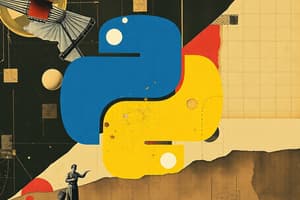Podcast
Questions and Answers
Which feature of Python allows for the testing and debugging of snippets of code?
Which feature of Python allows for the testing and debugging of snippets of code?
- Broad standard library
- Extendability
- Scalability
- Interactive Mode (correct)
What advantage does Python provide in terms of source code maintenance?
What advantage does Python provide in terms of source code maintenance?
- Easy-to-maintain (correct)
- Difficult readability
- High number of keywords
- Complex structure
Which of the following is NOT a platform that Python can run on?
Which of the following is NOT a platform that Python can run on?
- Solaris (correct)
- Linux
- Windows
- Macintosh
What does the extendability feature of Python allow programmers to do?
What does the extendability feature of Python allow programmers to do?
What is a prerequisite for learning Python as mentioned in the content?
What is a prerequisite for learning Python as mentioned in the content?
What is the correct command to start the Python interactive interpreter on Windows?
What is the correct command to start the Python interactive interpreter on Windows?
When setting the path for Python on Windows, what should you ensure about the additional text in the Path variable?
When setting the path for Python on Windows, what should you ensure about the additional text in the Path variable?
Which of the following is NOT a way to run Python as mentioned?
Which of the following is NOT a way to run Python as mentioned?
Which statement about Integrated Development Environments (IDEs) for Python is true?
Which statement about Integrated Development Environments (IDEs) for Python is true?
How should the Python script be executed from the command line in UNIX/Linux?
How should the Python script be executed from the command line in UNIX/Linux?
What is the purpose of the line 'raw_input("\n\nPress the enter key to exit.")' in a Python program?
What is the purpose of the line 'raw_input("\n\nPress the enter key to exit.")' in a Python program?
What is the first Windows interface for Python mentioned in the content?
What is the first Windows interface for Python mentioned in the content?
Which of the following correctly describes the use of a semicolon in Python?
Which of the following correctly describes the use of a semicolon in Python?
Which command correctly executes a Python script from the command line in Windows/DOS?
Which command correctly executes a Python script from the command line in Windows/DOS?
What should be ensured about the file permission mode when executing a Python script?
What should be ensured about the file permission mode when executing a Python script?
In Python, what is the function of a suite in a compound statement?
In Python, what is the function of a suite in a compound statement?
What is indicated by the command 'python -h' in command line usage?
What is indicated by the command 'python -h' in command line usage?
Which of the following statements best describes command line arguments in Python?
Which of the following statements best describes command line arguments in Python?
Which statement about Python identifiers is incorrect?
Which statement about Python identifiers is incorrect?
What is the consequence of improperly indented code in Python?
What is the consequence of improperly indented code in Python?
When is a Python identifier considered strongly private?
When is a Python identifier considered strongly private?
What does the line continuation character (
) signify in Python?
What does the line continuation character ( ) signify in Python?
Which of the following is a valid Python identifier?
Which of the following is a valid Python identifier?
In Python, how can you indicate a block of code without using braces?
In Python, how can you indicate a block of code without using braces?
What is the result of the following code snippet? if True: print 'True' else: print 'False'
What is the result of the following code snippet? if True: print 'True' else: print 'False'
Which operating systems have Python distributions available?
Which operating systems have Python distributions available?
What is the official website to download Python and its documentation?
What is the official website to download Python and its documentation?
What is required to compile Python source code manually for platforms lacking binary code?
What is required to compile Python source code manually for platforms lacking binary code?
During the installation of Python on Unix/Linux platforms, which command is used to install Python after configuring?
During the installation of Python on Unix/Linux platforms, which command is used to install Python after configuring?
What should be checked regarding the Windows system before installing Python using the MSI installer?
What should be checked regarding the Windows system before installing Python using the MSI installer?
Where is Python typically installed on Unix/Linux systems after installation?
Where is Python typically installed on Unix/Linux systems after installation?
Which of the following formats is NOT mentioned as a way to download Python documentation?
Which of the following formats is NOT mentioned as a way to download Python documentation?
What action is taken to customize options in the Python installation on Unix/Linux?
What action is taken to customize options in the Python installation on Unix/Linux?
Study Notes
Python Language Features
- Python is easy to learn due to its simple structure, clear syntax, and few keywords.
- Python code is readable and visually appealing.
- Python code is well-structured which makes it easy to maintain.
- Python's standard library is extensive and widely compatible across platforms including Unix, Windows, and Macintosh.
- Python features an interactive mode allowing testing and debugging of code snippets.
- Python is portable and runs on various hardware platforms while maintaining a consistent interface.
- Python enables adding low-level modules to the interpreter, allowing programmers to customize tools.
- Python provides interfaces to major commercial databases.
- Python supports the creation of Graphical User Interface (GUI) applications, which can be ported to different systems.
- Python offers better structure and support for large programs compared to shell scripting.
Python Tutorial Audience and Prerequisites
- The Python tutorial is designed for software programmers who are new to Python.
- A basic understanding of Computer Programming terminologies is recommended.
- Familiarity with any other programming languages is advantageous.
Python Environment Setup
- Python is available across platforms including Linux, Windows, and Mac OS X.
Installing Python
- The latest Python source code, binaries, documentation, and news are available on the official website: https://www.python.org/
- Python documentation is available in HTML, PDF, and PostScript formats on: https://www.python.org/doc/
- Python distributions are available for many platforms.
- Download the appropriate binary code for your platform and install Python.
- If the binary code is unavailable, you can compile the source code manually using a C compiler.
- Compiling allows customization of features in your Python installation.
Unix and Linux Installation
- Download the zipped source code for Unix/Linux from the official website.
- Extract the downloaded files.
- Run the following commands in your terminal:
./configuremakemake install
- Python will be installed at
/usr/local/binand its libraries at/usr/local/lib/pythonXXwhere XX is the Python version.
Windows Installation
- Navigate to the download page on the official website: https://www.python.org/downloads/
- Download the Windows installer file,
python-XYZ.msi, where XYZ is the version you need to install. - The Windows system should support Microsoft Installer 2.0 to use the
python-XYZ.msiinstaller.
Setting Path on Windows
- Select "Computer" from the Start menu.
- Choose "System Properties" from the menu.
- Click "Advanced system settings" (on the left), then click the "Advanced" tab.
- Click on "Environment Variables", under "System Variables", find "Path", and click on it.
- Click "Edit…", and add
;C:\Python27to the end of the Path in the "Variable value" box. - Click "OK".
Running Python
- There are three ways to start Python:
- Interactive Interpreter:
- Start Python from a command-line interpreter or shell window.
- Type
pythonin the command line.
- Script from Command-line:
- Execute a Python script from the command line.
- Type
python script.pywherescript.pyis the name of your Python file. Ensure file permissions allow execution.
- Integrated Development Environment (IDE):
- Use a graphical user interface (GUI) application that supports Python.
- Unix: IDLE is the first Unix IDE for Python.
- Windows: PythonWin is the first Windows IDE for Python.
- Macintosh: The Macintosh version of Python and the IDLE IDE are available from the main website.
- Interactive Interpreter:
Hello, Python!
- Create a file named
test.pywith the following code:#!/usr/bin/python print "Hello, Python!“ - Make the file executable with:
chmod +x test.py - Run the program with:
./test.py
Python Identifiers
- An identifier is a name used to identify variables, functions, classes, modules, or other objects.
- Identifiers start with a letter (A-Z or a-z) or an underscore (
_) followed by zero or more letters, underscores, and digits (0-9). - Punctuation characters such as
@,$, and%are not allowed within identifiers. - Python is case-sensitive:
Manpowerandmanpowerare distinct identifiers.
Python Identifier Naming Conventions
- Class names begin with an uppercase letter.
- All other identifiers start with a lowercase letter.
- A single leading underscore (
_) indicates a private identifier. - Two leading underscores (
__) indicate a strongly private identifier. - An identifier that starts and ends with two underscores (
__) is a language-defined name.
Reserved Words
- Python keywords are reserved words and cannot be used as identifiers (constants, variables, etc.).
- All Python keywords are lowercase.
Lines and Indentation
- Python uses indentation to define blocks of code for classes, functions, and flow control.
- Indentation is strictly enforced.
- The number of spaces in the indentation can vary, but all statements within a block must have the same indentation.
- For example:
if True: print "True" else: print "False"
Multi-Line Statements
- Python statements usually end with a new line.
- Use the line continuation character (
\) to indicate that a statement continues on the next line.
Waiting for User Input
- Use
raw_input()to display a prompt and wait for user input. - For example:
#!/usr/bin/python raw_input("\n\nPress the enter key to exit.")
Multiple Statements on a Single Line
- Use the semicolon (
;) to place multiple statements on a single line provided neither statement starts a new code block. - Example:
import sys; x = 'foo'; sys.stdout.write(x + '\n')
Suites
- Suites are groups of individual statements that form a single code block.
- Compound statements like
if,while,def, andclassrequire a header line and a suite. - Header lines start with the keyword, end with a colon (
:), and are followed by one or more lines that make up the suite. - Example:
if expression : suite elif expression : suite else : suite
Command Line Arguments
- Use command-line arguments to provide input to your Python script.
- To access arguments, use the
sys.argvlist in your script. - You can also specify options and arguments to Python itself.
- For example:
python -hwill display the help message.
Studying That Suits You
Use AI to generate personalized quizzes and flashcards to suit your learning preferences.
Related Documents
Description
Explore the key features of Python that make it a popular programming language. This quiz covers aspects such as readability, portability, and extensive libraries, providing insights into why Python is favored by developers. Test your understanding of Python's unique characteristics and functionalities.




